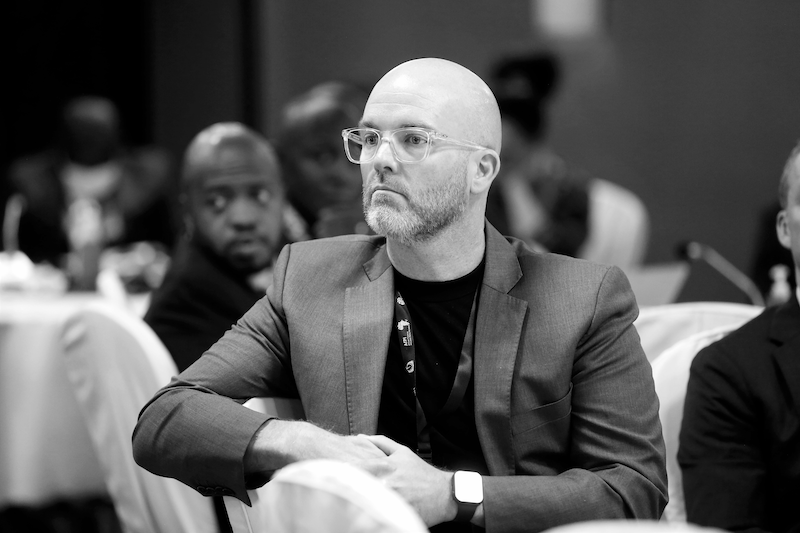Copper Chief Risk Officer Says ‘Cellular Explosion’ Will Accelerate Crypto Usage
TradFi veteran brings real-time payments background at Mastercard to crypto custody firm

Tim Neill, Copper Chief Risk Officer | Source: Copper
- First nation to commit to a central bank digital currency will start “an avalanche of very similar types of evolution,” Tim Neill says
- Non-crypto firms such as Mastercard will be unable to pivot at a speed that blockchain technology demands, according to the Copper executive
The new chief risk officer at Copper is looking to put his extensive traditional finance background to work to help the crypto custodian mix the best of banking operations with a DeFi slant.
Tim Neill comes from Mastercard, where he helped the financial services giant bolster its real-time payments business. He joined the company through Mastercard’s acquisition of payment systems builder VocaLink in 2016 for roughly $920 million.
A former executive at Deutsche Bank, Standard Chartered Bank and London Stock Exchange Group, Neill has focused on payments, open banking, financial services and technology over the course of his career.
Founded by Dmitry Tokarev in 2018, Copper provides custody, prime brokerage and settlement services to institutional investors.
Neill’s hire followed the company bringing aboard five former Bank of America Merrill Lynch employees to lead the expansion of its prime infrastructure offerings. Copper also hired former Citi executive Sabrina Wilson — to whom Neill will report — as chief operating officer.
Neill sat down with Blockworks for an interview about what he is keeping an eye on in his new role and what trends he is seeing in the broader crypto space.
Blockworks: What were you focused on at Mastercard?
Neill: I was running the [real-time] payments business, and then we decided to diversify even further, and we started getting into digital assets, CBDCs, cross-border payments…The approach to build core real-time payment systems really becomes the foundational rail with which to add on all these services.
One of the things I became quite passionate about through that time at Mastercard was looking at financial inclusion.
You have to be able to democratize the access to financial services for parts of the world that simply won’t be able to get what we consider to be mature market access vehicles. What’s happened over the recent years is an explosion in cellular connectivity across these emerging markets and frontier markets.
Blockworks: How does this relate to crypto?
Neill: When you start looking at democratizing financial payment vehicles, that inevitably takes you down the path toward looking to be able to connect those people through real-time banking payment solutions on a cellular platform.
One of the things that became hugely obvious to me is that digital assets, in their various forms and functions, suddenly get presented to this community that previously has had virtually zero exposure to banking options.
So you can be a subsistence farmer in the hillsides of Thailand and you can be trading on eToro. You can be deciding that you actually want to drop more money into [a cryptoasset]…and you’re doing it through your smartphone and the trade is in real time.
Blockworks: Why did you join Copper in this role?
Neill: All of that tech stack [at Mastercard] fascinated me, and we were doing lots of work on being able to convert our core payments rails at a national level into different forms of enablement through digital asset activity.
One of the challenges that Mastercard will have — and I saw the same challenges at Standard Chartered and Deutsche Bank — is that they are big, old institutions that have been making cookies a certain way for 50 years, and suddenly now they have to pivot to quite a different business model. The challenge for them is going to be that they are bound by often pre-existing banking legislation and restrictions that prohibit their ability to pivot at a speed that the technology demands.
One of the reasons Copper appealed to me…is the fact that it’s purpose-built. It is a specialist shop that looks at just digital assets.
Another thing I saw that also spurred my interest in coming over to Copper was that Covid accelerated that take-up of cellular-based democratization of financial inclusion.
 Tim Neill, Copper Chief Risk Officer
Tim Neill, Copper Chief Risk Officer
Blockworks: What will you be most focused on at Copper?
Neill: Our plan is to take the best bits of banking and financial operations, but cut that against a DeFi approach. That is where we need to use those particular risk governance aspects that help support the business and give a high level of trust for our clients.
We basically need to drive an agenda where we help really set a theme and a tone within the industry. We need to look at starting to publish statements and whitepapers and approaches to things like custody services in this new style of service provision.
And the way that we can do that really is by utilizing some of the brain work of the folks that are inside the shop that have come from the big houses and have been doing it for many years and turn that into a pragmatic digital assets methodology that will satisfy the client expectations but also will meet the legislation that’s due to come out.
We’re waiting for legislation. We want it to come, because that gives us the guide rails that we need. But in the interim, what we fully intend to do is to interact with the regulators and the legislators and talk to them and understand what they expect from us, so we can do it the right way early. And then my hope is that we can then help influence the way that should be developed.
[Our clients] are now asking us about the technology stack that we’re intending to use, and they’re interested in being able to utilize that as a potential service provider. Similar to the way big institutions struggle to change their business model very fast, because we’re building it from scratch, in theory we build it faster, better and more prescribed.
Blockworks: What do you expect to see from a crypto regulation standpoint?
Neill: What I’m hoping to see legislative-wise is a common-sense approach using the technology that’s in place today. So we’re going to see the modernization of things like blockchain enablement.
The reality is that we wanted to use enough that we’re reflective of the clients’ expectations, but we’re not looking to add bureaucratic noise on top of what’s already there. Anyone who works in banking and anyone who has to deal with banks, which is the majority of the mature markets, finds it hugely frustrating for a bunch of reasons.
A lot of that’s come about because there’s been issues in the past with the way banks have managed themselves. Because we’re looking at blockchain enablement and distributed ledger technologies, many of those fundamental issues go away — things like man-in-the-middle attacks or spoof ID-type approaches and KYC elements — because of the blockchain methodology being used.
So what I’m hoping for is that the legislation reflects that, and we want to try to influence that conversation by supporting those regulators and talking to them about what we’re building, how we think it should run, creating conversations between us and counterparties around the world and establishing a footprint in those territories as a licensed business to make a statement to those regulators that we mean business.
Blockworks: What part of the space do you have your eye on going forward?
Neill: I want to see who’s going to lead the race on CBDCs. Which nation-state is going to come forward, hammer that peg into the ground, and say we are pegging against X currency, and it’s going to look like this, it’s going to operate like this?
When that first central bank comes forward and makes that statement, I think you’ll see an avalanche of very similar types of evolution take place across the central bank layers.
Blockworks: Who do you expect could be first?
Neill: I really do believe they’re all waiting for someone else to hammer in the first peg…whether it’s the Singaporeans, whether it’s going to be the Fed. It could be an outlier — a France or a Denmark — or it could even be wider afield out of Africa.
Many of the central banks particularly across the [Gulf Cooperation Council] states — the UAE, Saudi, Qatar — are very advanced, and I wouldn’t be surprised if one of them pops up first with perhaps something like an oil and gas pegging or a gold alignment. That would make a lot of sense, and you could see how they could leverage that.
That’s a very exciting opportunity for us, because all of a sudden we can start talking about setting a custody service against this whole new digital agenda.
This interview has been edited for clarity and brevity.
Get the news in your inbox. Explore Blockworks newsletters:
- The Breakdown: Decoding crypto and the markets. Daily.
- 0xResearch: Alpha in your inbox. Think like an analyst.






